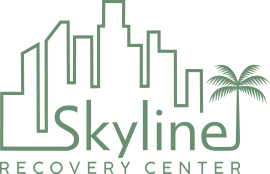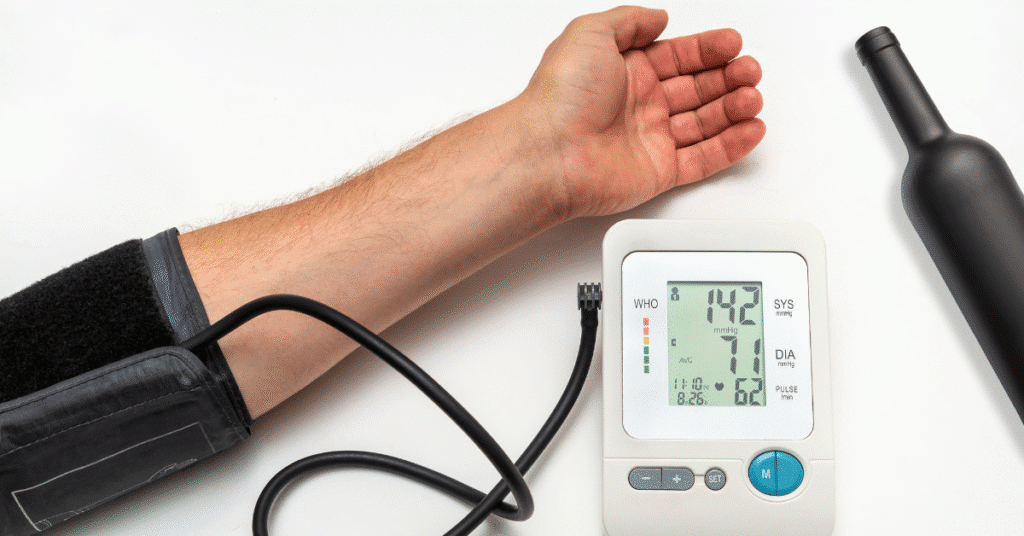You might be surprised to learn how alcohol affects your blood pressure, even if you don’t drink excessively.
In fact, the National Institute on Alcohol Abuse and Alcoholism (NIAAA) reports that nearly 1 in 3 adults in the U.S. has high blood pressure, and alcohol consumption is a major contributing factor.
While a drink here and there might not cause immediate harm, regular alcohol use can cause your blood pressure to spike, and over time, it can increase your risk of hypertension and related heart issues.
Let’s look into the effect of alcohol on blood pressure and what you can do to protect it.
What is the Effect of Alcohol on Blood Pressure?
When it comes to alcohol, many people don’t realize the significant impact it can have on blood pressure. A drink here and there might seem harmless, but the way alcohol interacts with your body can lead to long-term health concerns.
Whether you’re casually sipping on a glass of wine or have struggled with heavier drinking, understanding how alcohol affects your blood pressure is important for maintaining a healthy lifestyle.
Here’s how alcohol affects blood pressure in the short term and long term:
The immediate effect of alcohol on blood pressure:
When you have a drink, it’s not uncommon for your blood pressure to rise temporarily. Alcohol increases your heart rate and can cause your blood vessels to narrow, which results in a short-term spike in blood pressure.
This increase is usually short, but it can still have an impact, especially if you’re drinking often.
As a diuretic, alcohol can also make you lose water, thickening the blood, and increasing pressure.
Long-Term Effects of Excessive Drinking
The real issue with alcohol and blood pressure arises when drinking becomes a habit. Heavy drinking or binge drinking over time can lead to chronic hypertension and many other conditions.
Understanding ‘what are the long-term effects of alcohol on blood pressure’ is therefore important. Some of these effects are:
- Chronic High Blood Pressure: Prolonged heavy drinking can lead to hypertension, putting strain on your heart and blood vessels.
- Heart Disease: Long-term alcohol use increases the risk of heart disease, including arrhythmias and heart attacks.
- Stroke Risk: Drinking heavily over time can increase the risk of a stroke due to its effects on blood pressure and the heart.
- Liver Damage: Excessive drinking can lead to cirrhosis, fatty liver, and other liver-related issues.
- Kidney Damage: Chronic drinking can damage the kidneys, impairing their ability to regulate blood pressure effectively.
- Weak Immune System: Heavy drinking weakens the immune system, making it harder for the body to fight infections.
What is the Impact of Alcohol on Hypertension and Heart Health?
The link between alcohol consumption and high blood pressure (hypertension) is well-established and can have serious long-term health effects. This is due to several factors, including alcohol’s ability to narrow blood vessels.
Furthermore, it can disrupt the balance of hormones that regulate blood pressure, causing elevated blood pressure over time.
It also affects the autonomic nervous system, which controls involuntary functions like heart rate and blood pressure.
The more often and heavily someone drinks, the greater the risk of developing chronic hypertension. This condition significantly raises the chances of developing heart disease, stroke, and other serious health issues.
What are the Signs of Alcohol Affecting Your Blood Pressure?
When alcohol begins to affect your blood pressure, the signs can range from subtle to more noticeable.
Here are some common signs that alcohol may be impacting your blood pressure:
- Regularly experiencing headaches or migraines, especially after drinking.
- Feeling dizzy or lightheaded after drinking may indicate a sudden change in your blood pressure levels, which can be exacerbated by alcohol.
- It can strain the heart and lungs, leading to difficulty breathing or feeling winded even after mild exertion.
- It can lead to feelings of fatigue or weakness, as the heart works harder to pump blood through constricted blood vessels.
- A racing heart or chest pain can be symptoms of hypertension caused by alcohol, as the heart struggles with increased pressure.
- It can sometimes lead to vision changes such as blurriness or seeing spots, which could be linked to alcohol use.

Scientific Studies on the Alcohol Effect on Blood Pressure
There have been several studies that highlight the connection between alcohol consumption and blood pressure, showing just how much alcohol can affect your cardiovascular health.
One important study by the National Institutes of Health (NIH) reviewed 36 trials involving over 2,800 people. It found that reducing alcohol intake significantly lowered both systolic and diastolic blood pressure, especially for those who were heavy drinkers (six or more drinks per day). The more they cut back on alcohol, the more their blood pressure improved.
Another NIH study found that alcohol triggers the sympathetic nervous system, releasing hormones that lead to higher blood pressure. This study suggests that controlling alcohol intake is crucial to avoid long-term hypertension.
In addition, research published in PubMed Central discovered that even moderate drinking increases blood pressure in a dose-dependent manner, meaning the more you drink, the higher your blood pressure tends to rise.
These studies clearly show that alcohol has a direct effect on blood pressure. Reducing alcohol intake can make a big difference in maintaining healthy blood pressure and preventing serious heart-related problems.
How to Get Help for Alcohol Addiction?
If you or someone you know is struggling with alcohol addiction, it’s important to know that help is available.
Seeking professional support can make all the difference in the recovery journey.
Here’s how you can get started:
- Reach Out to a Healthcare Provider: The first step is often to talk to your doctor or a healthcare professional. They can assess the level of addiction and help guide you to the appropriate treatment options, including therapy, detox, or rehabilitation programs.
- Consider Outpatient or Inpatient Treatment: Depending on the severity of the addiction, you may benefit from an outpatient treatment program or Inpatient rehab centers that provide 24/7 care and are often the best option for those with more severe addictions.
- Join Support Groups: Support groups like Alcoholics Anonymous (AA) provide a safe space for those in recovery to share experiences and support each other.
- Counseling and Therapy: Therapy, such as cognitive-behavioral therapy (CBT) or motivational enhancement therapy, can help you identify triggers, change unhealthy thought patterns, and develop coping skills.
- Explore Medication-Assisted Treatment: In some cases, medication may be prescribed to help reduce alcohol cravings and prevent relapse. These medications work best when combined with therapy and support.
- Consider a Sober Living Environment: For ongoing support and stability, consider a sober living house. These facilities provide a structured, alcohol-free environment while you work on building the skills needed to maintain long-term sobriety.
- Stay Committed: Recovery is a process, and staying committed is key. It might take time, but with the right support, tools, and mindset, lasting sobriety is absolutely possible.
Take the First Step Towards a Healthier Future
Struggling with alcohol addiction is tough, but you don’t have to face it alone. At Skyline Recovery Center, we’re here to help you break free and rebuild your life. Whether you’re ready to start treatment, need more information, or just want someone to talk to, we’re here for you.
Reach out today to discover how we can support you on your path to recovery. Let’s take that first step together.


